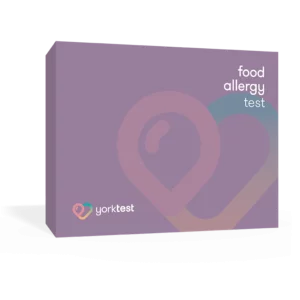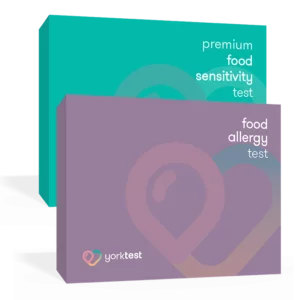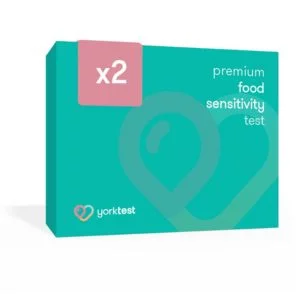

What is the difference between a nut allergy and sensitivity?
Nut allergies and nut sensitivities are distinct but related immune responses. A nut allergy is a reaction triggered by the immune system when it mistakenly identifies nut proteins as a threat. This immune response can lead to potentially severe symptoms, including anaphylaxis, a life-threatening allergic reaction that requires immediate medical attention. Allergic reactions typically occur soon after consuming or coming into contact with nuts.
Alternatively, nut sensitivity generally doesn’t affect the immune system in the same direct way. Instead, it might be due to the body’s inability to properly digest or process certain components of nuts, or may involve a less severe immune response. Symptoms of nut sensitivity can be less immediate and more subtle, often occurring hours after consumption and mainly affecting the digestive system.


Nut Sensitivity Symptoms
If you have an intolerance or sensitivity (defined by YorkTest as a food-specific IgG reaction) to nuts, your body produces an inflammatory response to one or more of the particular nut proteins.
It is important to understand that a nut Intolerance is very different to nut allergy.
If you have an allergy to nuts, you may feel unwell immediately after consuming them, experiencing a serious reaction which often requires instant medical attention. If you have nut intolerance or sensitivity, the reaction you may experience would be delayed and less severe.
Nut sensitivity symptoms vary between individuals and can range from mild to severe. They are often related to the digestive system and may include the following:
- Abdominal pain
- Bloating
- Gas
- Nausea
- Diarrhea
- Headaches
- Joint pain
- Skin rashes
- Fatigue
Unlike nut allergies, which can cause immediate and life-threatening symptoms such as difficulty breathing or a rapid drop in blood pressure, the symptoms of nut sensitivity tend to appear gradually, often a few hours after consumption.
It’s important to note that these symptoms can be associated with many different conditions, so if you consistently experience discomfort after consuming nuts, it’s a good idea to explore the possibility of a nut sensitivity.


Where To Look:
There are many products which contain nuts, either as flavoring or as toppings. Being aware of these is important when making changes to optimize your diet and avoid your trigger foods. A test is needed to determine which particular nuts might specifically be causing you a problem. The following list includes ingredients which may need to be avoided if you have nut intolerance:
- Legumes (peanuts)
- Beans, peas, alfalfa, lentils and soybeans
- Drupes (almonds and walnuts)
- Tree nuts (pistachios, hazelnuts, pecans, pinenuts, chestnuts, brazil nuts, cashews and macadamia)
- Coconut
- Nut oils
How to Test for Nut Sensitivity
If you think you might have a nut sensitivity, you can start with an elimination diet, where you exclude nuts from your diet for a certain period of time and monitor your symptoms. If symptoms minimize during the elimination period, it’s an indication that nuts might be the issue.
An easier and more precise way to determine if you have a nut sensitivity is through food sensitivity testing. At Yorktest, our premium food sensitivity tests measure your body’s immune response to different foods, including various types of nuts. It analyzes your IgG antibodies 1-4 through a simple finger prick blood sample, one of the most accurate methods of testing. The blood test can identify over 200 ingredients to which you may be sensitive and ranks their severity in an easy-to-read traffic light system to help you eliminate the right foods.
However, if you suspect you have a nut allergy that can be life-threatening, as opposed to a nut sensitivity, you should seek immediate medical attention.


Replacements For A Balanced Diet
Nuts provide your diet with good fats, as well as being a source of zinc, calcium and protein. If you have nut intolerance, you can supplement your diet with a variety of alternatives including:
- Olives
- Sunflower seeds
- Pumpkin seeds
- Avocado
If you have found out that you are intolerant to nuts through taking a food sensitivity test, changing your diet need not be daunting. YorkTest Nutritional Therapists are here to help you understand how to optimize your food choices.
Information provided above regarding Food Intolerance (defined by yorktest as a food specific IgG reaction) is intended to provide nutritional advice for dietary optimization. yorktest recommend that you discuss any medical concerns you have with a doctor before undertaking a yorktest program.


Premium Food Sensitivity Test
$139
FREE shipping on all orders
The Premium Food Sensitivity Test measures your IgG reactivity to 200 foods and drinks. Get answers on which foods could be triggering your IBS symptoms, headaches, bloating, tiredness, and more. Simply collect your finger-prick blood sample at home. Mail it to our laboratory for testing. Then receive your results online within 7 days!
- 200 ingredients tested
- Tests are HSA and FSA accepted
- Analyzed in our accredited laboratory
- Clear, color-coded results show your IgG reactivity score for each ingredient
Customers must be aged 18 years or over to take this test. For under 18s, take our Junior Food Sensitivity Test. This test is not available to customers who are pregnant or breastfeeding.
Other Intolerances
Case Studies


Julie Castledon
- IBS / Digestive Problems
- Nausea
- Skin Conditions
- Tiredness / Fatigue


Alison Dunn
““The Entire Engagement With York Test From End To End Was Very Easy, Professional And Fast””
- IBS / Digestive Problems


Lynne Williams
“All my symptoms have noticeably decreased. I feel excited and alive again”
- IBS / Digestive Problems
- Mental Health
- Tiredness / Fatigue


Bianca Dodds
- Brain Fog
- IBS / Digestive Problems
- Tiredness / Fatigue


David Brown
“I am a different person and the brain fog, anxiety and depression have now disappeared. I feel reborn and finally have my life back”
- Mental Health
- Tiredness / Fatigue
















